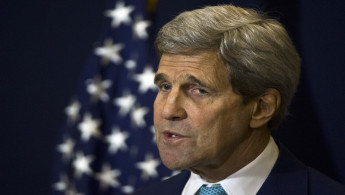Massacre in Syria as Washington hints at Assad negotiations
It is not clear whether the US administration has deliberately chosen the fourth anniversary of the Syrian uprising to announce officially what has been circulated in the media for some time, that it will negotiate with the Assad regime.
On Sunday, March 15, Secretary of State John Kerry said Washington would "have to negotiate in the end... in the context of the Geneva I process", in reference to the 2012 negotiations for a political transition in Syria.
The remarks were made in an interview with CBS News and are the culmination of a series of official statements hinting at Syria strategy, the most recent of which were made by CIA director John Brennan.
'Not in US interests'
| The spy agency chief said Washington had reason to worry about who might replace President Bashar al-Assad if his government fell. |
Brennan said that a chaotic collapse of the Syrian regime was not in the interests of the US.
The spy agency chief said Washington had reason to worry about who might replace President Bashar al-Assad if his government fell, given the rise of the Islamic State group (IS, formerly known as Isis) and other jihadists in Syria.
Similar remarks were leaked recently to the media in Paris, following the end of talks led by the UN envoy to Syria, Staffan de Mistura, to secure a truce in Aleppo. The gist of the French leaks was that France no longer believed Assad's departure was a necessary precondition for political negotiations.
The Syrian regime responded to these international overtures by carrying out what was reported to be a new massacre in Douma.
Beginning on Sunday morning, the anniversary of the revolution, the Syrian air force carried out intense air raids using thermobaric bombs, killing around twenty and destroying large parts of the city centre.
Dozens of residents were trapped under the rubble of their homes, according to local activists, who provided a preliminary count of the casualties they said included a number of women and children.
This new-old Western bid to normalise relations with the Assad regime under the banner of unifying efforts against jihadist groups - the issue to which Syria has been reduced by the international community - has been echoed by some in the ranks of the opposition Syrian National Coalition (SNC).
SNC leader Khaled Khoja has suggested there would be more cooperation with internal opposition forces, specifically the National Coordination Committee for Democratic Change (NCC). Remember that the NCC has refrained, from the outset, from demanding Assad step down as a precondition for a negotiated settlement.
Khoja explicitly suggested this demand was not a "precondition", but rather is "the natural result of any political negotiations".
Assad to remain in power?
Bassam al-Malek, an SNC member living in Cairo, was less equivocal than Khoja. "The next Cairo conference will discuss two points related to a settlement that the Syrian regime might accept, to propose them in the dialogue with the regime in Moscow," he said.
These two points, Malek continued, would include accepting Assad remain in power for two years with a transitional body governing the country.
| Early presidential elections would be called, to be followed by a transitional constitution or the restoration of the 1950 constitution. |
After that, presidential elections would be called, to be followed by a transitional constitution or the restoration of the 1950 constitution, Malek said.
"The second dialogue session between the Syrian opposition and regime, which Moscow will host in April, will take place most likely after the second opposition conference in Cairo in the same month."
However, SNC member Riad al-Hassan, told al-Araby al-Jadeed, that all statements from SNC members are merely "personal opinions". He stressed the official SNC position remains what was agreed upon at its last meeting, stated in the official communique, saying any new position would have to be discussed during the SNC's regular meeting later this month.
The meeting will also discuss agreements concluded with the NCC in Paris last month, he added.
Nevertheless, Hassan said he believed UN envoy Staffan de Mistura would soon declare the failure of his initiative to freeze the fighting in Aleppo.
This, he said, means the international community may have to look for "new formulas for a solution in line with developments", though Hassan was not optimistic about any serious international effort in Syria, which, he said, was not a priority on the international agenda.
This is an edited translation from our Arabic edition.



